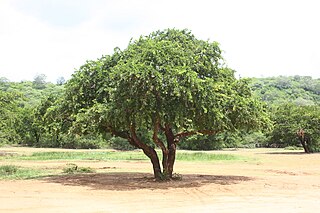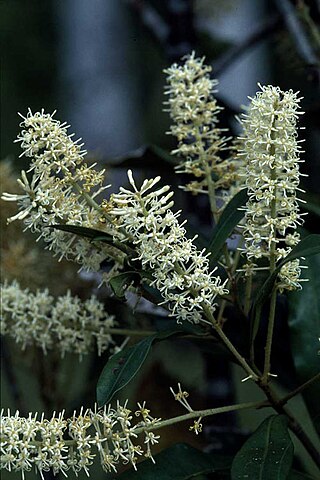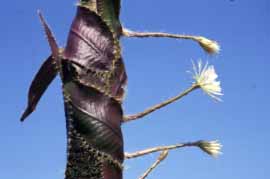
Passiflora, known also as the passion flowers or passion vines, is a genus of about 550 species of flowering plants, the type genus of the family Passifloraceae.

Cerbera is a genus of evergreen trees or shrubs, native to tropical Asia, Australia, Madagascar, and various islands in the Indian and Pacific Oceans.

Nuphar lutea, the yellow water-lily, brandy-bottle, or spadderdock, is an aquatic plant of the family Nymphaeaceae, native to northern temperate and some subtropical regions of Europe, northwest Africa, and western Asia. This species was used as a food source and in medicinal practices from prehistoric times with potential research and medical applications going forward.

Limonia acidissima is the only species within the monotypic genus Limonia. Common names for the species in English include wood-apple and elephant-apple. It is sometimes also called monkey fruit.

Hymenosporum is a monotypic genus of trees in the family Pittosporaceae. The sole included species is Hymenosporum flavum, commonly known as native frangipani, found in the rainforests and wet sclerophyll forests of New Guinea, Queensland and New South Wales. Despite its common name, it is not closely related to the frangipani, but is related to the widespread genus Pittosporum.
The Queen City Yacht Club (QCYC) is a maritime-themed club based in Toronto, Ontario. It is located on Algonquin Island in the Toronto Islands, and has been a part of Toronto's sailing community since it was founded in 1889. Toronto at the time was known as the "Queen City of the Lake". The original clubhouse was located on the city side of Toronto Harbour, at the foot of York Street.
Roscoea brandisii is a species of herbaceous flowering plant in the Zingiberaceae family. It is a perennial found in the state of Meghalaya, India. Most members of the ginger family, to which it belongs, are tropical, but R. brandisii, like other species of Roscoea, grows in much colder mountainous regions.

Rebutia minuscula is a species of cactus from South America found in northern Argentina and Bolivia. It is the type species of the genus Rebutia. As its synonym Rebutia senilis it has gained the Royal Horticultural Society’s Award of Garden Merit. Its cultivars 'Krainziana', 'Marsoneri' and 'Violaciflora' are also listed as having gained the Award of Garden Merit.

Nothorites is a monotypic genus in the macadamia family Proteaceae. The sole species, Nothorites megacarpus, is endemic to the wet tropics rain forests of northeastern Queensland, Australia.

Fockea is a genus of succulent scrubs native to Africa south of the equator. They are members of the Asclepiadoideae (milkweeds), a subfamily of the dogbane family Apocynaceae. Of the six recognized species, only the two most widely distributed extend north of southern Africa, with F. multiflora reaching as far north as Tanzania and F. angustifolia reaching to southern Kenya. Fockea are known as water roots, a reference to the bulbous caudex characteristic of most species, which is also edible in at least some species.
Afrocalathea is a genus of plants native to Africa. It contains only one species: Afrocalathea rhizantha (K.Schum.) K.Schum, known from Nigeria, Cameroon, Gabon, Cabinda, and Congo-Brazzaville.
Heinsenia is a monotypic genus of plants, shrubs or small trees growing in Africa. Its only species is Heinsenia diervilleoides. The Royal Botanic Gardens, Kew collected a specimen.

Strophocactus wittii, synonym Selenicereus wittii, known as the Amazon moonflower, is a species of plant in the genus Strophocactus in the cactus family (Cactaceae), and is one of several species commonly called "moonflowers". It was first described in 1900 and is one of three species of cactus found in the central Amazon basin.
Cyperus maranguensis is a species of sedge that is native to parts of eastern Africa. This species was first identified by K.Schum, the first scientific description dating to 1895. The plant is also a part of the Cyperus genus.
Semecarpus magnificus is a species of plant in the family Anacardiaceae. It is endemic to New Guinea.
Cardamine incisa is a species of flowering plant in the mustard family Brassicaceae.
Nymphaea × thiona is a species of waterlily native to the US-American states Alabama, Florida, and Georgia. Additionally, it has been introduced to Costa Rica, as well as the US-American states Kentucky, and Nevada. It is a natural hybrid of Nymphaea mexicana and Nymphaea odorata.

Nymphaea gracilis is a species of waterlily endemic to Mexico. It is the only species of its genus, which is endemic to Mexico.
Nymphaea guineensis is a species of waterlily native to the region spanning from tropical West Africa to Chad.
Nymphaea maculata is a species of waterlily native to tropical Africa.









